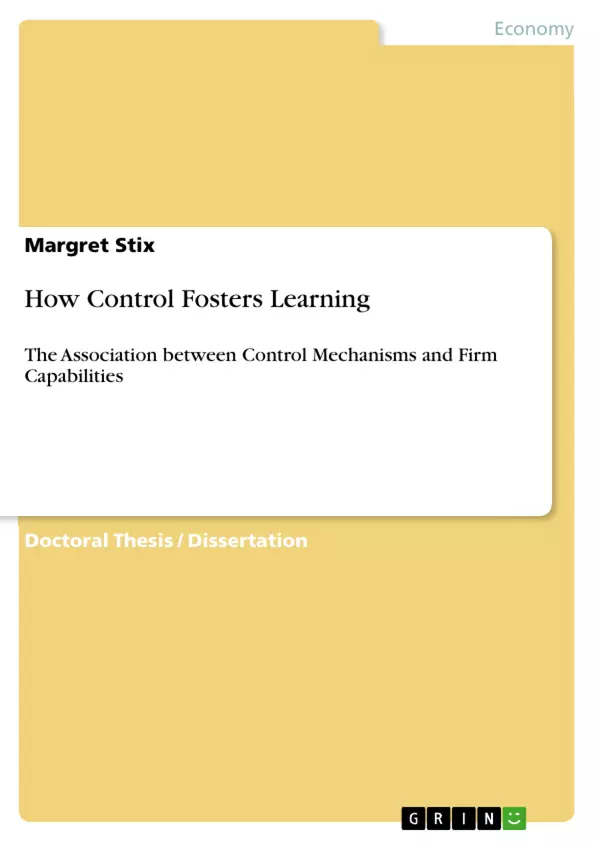This dissertation brings together research on organizational control systems and research on organizational learning and organizational capabilities. In doing so, the question how control mechanisms and firm capabilities are associated with each other is examined. I acknowledge that organizational control mechanisms are organizational routines that can modify or leverage strategic capabilities of firms through the fostering of organizational learning. Analyzing the association of specific control strategies with specific organizational capabilities I argue that alternate configurations of organizational control systems differ in terms of their complementarity or fit to certain organizational capabilities and that competitive advantage can be gained when organizations achieve an appropriate match of both. My hypotheses are tested using data from a survey of 238 manufacturing firms in Austria and Germany.
Diese Dissertation verknüpft die bestehende Literatur zu den Themen Steuerungsmechanismen, Organisationales Lernen und Kompetenzen von Unternehmen. Insbesondere wird die Fragen untersucht, wie Steuerungssysteme und organisationale Fähigkeiten zusammenhängen. Im Rahmen der Arbeit wird die These aufgestellt, dass Steuerungsmechanismen, ähnlich wie organisationale Routinen wirken und die Fähigkeiten und Kompetenzen von Unternehmen beeinflussen bzw. deren Entwicklung fördern können. Im Rahmen einer empirischen Untersuchung wurden 238 Unternehmen der Maschinenbau- Branche in Deutschland und Österreich befragt. Basierend auf den Umfrageergebnissen lässt sich feststellen, dass verschiedene Konfigurationen von Steuerungsmechanismen besser zu bestimmten organisationalen Fähigkeiten passen als andere. Weiters wird argumentiert, dass Firmen durch passende Kombinationen von Steuerungssystemen und organisationalen Fähigkeiten einen langfristigen Wettbewerbsvorteil aufbauen können.
Inhaltsverzeichnis (Table of Contents)
- 1 Introduction
- 2 Literature review
- 2.1 An introduction to the theory of management control systems
- 2.1.1 Definitions of management control
- 2.1.2 Classifications of management control systems
- 2.1.3 MCS as a package
- 2.1.4 Contextual variables influencing MCS
- 2.1.5 MCS and learning
- 2.2 An introduction to the resource-based view theory
- 2.2.1 Background
- 2.2.2 Definition of key terms
- 2.2.3 Strategic recourses as source of competitive advantage
- 2.2.4 From competitive advantage to superior performance
- 2.2.5 Limitations of the traditional RBV
- 2.3 An introduction to the dynamic capability theory
- 2.3.1 Background
- 2.3.2 What are dynamic capabilities?
- 2.3.3 The development of dynamic capabilities
- 2.3.4 The dynamic capability theory as extension of the traditional RBV
- 2.3.5 Limitations of the dynamic capability theory
- 2.4 Management control systems and firm capabilities – State-of-the-art
- 2.4.1 MCS as valuable, rare, inimitable and non-substitutable resources
- 2.4.2 MCS and strategic resources as related variables
- 2.4.3 MCS as antecedents of dynamic capabilities
- 2.1 An introduction to the theory of management control systems
- 3 Theory development and hypotheses
- 3.1 Definition of key variables
- 3.1.1 Operationalizing MCS
- 3.1.2 Operationalizing dynamic capabilities
- 3.1.3 Operationalizing performance
- 3.1 Definition of key variables
Zielsetzung und Themenschwerpunkte (Objectives and Key Themes)
This dissertation investigates the relationship between organizational control mechanisms and firm capabilities. It aims to understand how control mechanisms, acting as organizational routines, can influence and foster the development of firm capabilities. The key themes explored in the dissertation are:- The association between management control systems and organizational capabilities
- The role of control mechanisms in fostering organizational learning and capability development
- The identification of specific configurations of control systems that are complementary to specific organizational capabilities
- The potential of achieving competitive advantage through appropriate matching of control systems and organizational capabilities
- Empirical evidence derived from a survey of manufacturing firms in Austria and Germany
Zusammenfassung der Kapitel (Chapter Summaries)
The dissertation begins with an introduction to the concept of management control systems, examining their definitions, classifications, and contextual variables. It explores how control mechanisms can be viewed as organizational routines that influence firm capabilities. The resource-based view (RBV) theory is introduced as a framework for understanding competitive advantage, focusing on strategic resources and their role in achieving superior performance.
The dynamic capability theory is then discussed as an extension of the RBV, highlighting the importance of dynamic capabilities in achieving sustained competitive advantage. The dissertation delves into the relationship between management control systems and firm capabilities, exploring how control systems can act as valuable, rare, inimitable, and non-substitutable resources. It examines the link between control systems and strategic resources, as well as the role of control systems as antecedents of dynamic capabilities.
Schlüsselwörter (Keywords)
This dissertation focuses on management control systems, organizational capabilities, organizational learning, resource-based view, dynamic capability theory, competitive advantage, empirical research, and manufacturing firms. It investigates the relationship between control mechanisms and firm capabilities, exploring their complementary fit and the potential to achieve sustained competitive advantage through appropriate matching.Frequently Asked Questions
How do Management Control Systems (MCS) influence firm capabilities?
MCS act as organizational routines that can modify or leverage strategic capabilities by fostering organizational learning and aligning resources.
What is the Resource-Based View (RBV)?
The RBV is a theory that suggests firms achieve competitive advantage by possessing valuable, rare, inimitable, and non-substitutable resources.
What are dynamic capabilities?
Dynamic capabilities are a firm's ability to integrate, build, and reconfigure internal and external competences to address rapidly changing environments.
Can MCS lead to a competitive advantage?
Yes, when organizations achieve an appropriate match (fit) between their control configurations and their specific organizational capabilities.
What was the focus of the empirical study in this dissertation?
The study surveyed 238 manufacturing firms in Austria and Germany to test how different control strategies associate with specific organizational capabilities.
- Quote paper
- Margret Stix (Author), 2010, How Control Fosters Learning, Munich, GRIN Verlag, https://www.grin.com/document/189077



